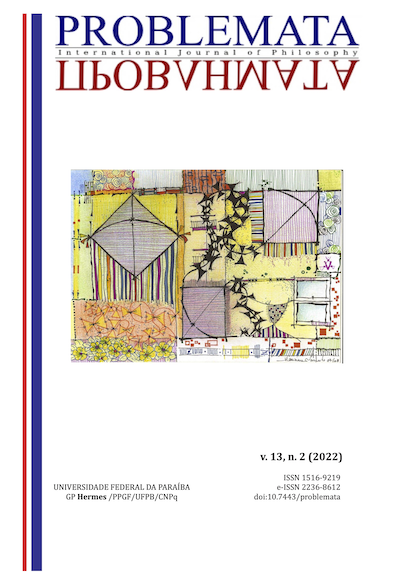ZARATUSTRA:
FROM THE SUBJECT OF THE MASK TO REDEMPTION
DOI:
https://doi.org/10.7443/problemata.v13i2.63649Keywords:
Zarathustra, Redemption, NietzscheAbstract
Analysis of the work Thus spoke Zarathustra (1883-1885), by the German philosopher Friedrich Nietzsche. More specifically, they stop at the second moment of that work, Da redemption. In a sense, Zarathustra - as a kind of mask over Nietzsche's face - presents a good part of Nietzschean doctrine: there is a walk, or a crossing, that will take him to the hero's journey, both in terms of content and in the style of narrating your philosophy. Therefore, Zarathustra, as a mask for the philosopher Nietzsche, weaves his criticisms of the West, being also a mask through which the journey is taken and the subject's redemption is reached.
Downloads
References
CORDEIRO, Robson Costa. Espírito de vingança e redenção da vontade em ‘Assim falou Zaratustra’. Porto Alegre, RS: Editora Fi, 2016.
MELO NETO, João Evangelista Tude de. 10 lições sobre Nietzsche. Petrópolis, RJ: Vozes, 2017.
NIETZSCHE, Friedrich Wilhelm. Assim falava Zaratustra: livro para toda a gente e para ninguém. Tradução José Mendes de Souza. Rio de Janeiro: Nova Fronteira, 2016A.
NIETZSCHE, Friedrich Wilhelm. Ecce homo: como cheguei a ser o que sou. Tradução Lourival de Queiroz Henkel. Rio de Janeiro: Nova Fronteira, 2016B.
NIETZSCHE, Friedrich Wilhelm. Assim falou Zaratustra: um livro para todos e para ninguém. Tradução de Mário da Silva. 8. ed. Rio de Janeiro: Bertrand Brasil, 1995.
VATTIMO, Gianni. Diálogo com Nietzsche: ensaios 1961-2000. Tradução Silvana Cobucci Leite. São Paulo: Editora WMF Martins Fontes, 2010.
VATTIMO, Gianni. O sujeito da máscara: Nietzsche e o problema da libertação. Tradução Silvana Cobucci Leite. Petrópolis, RJ: Vozes, 2017.
Downloads
Published
Issue
Section
License
Copyright (c) 2022 Adelino Pereira da Silva

This work is licensed under a Creative Commons Attribution 4.0 International License.
Authors who publish with this journal agree to the following terms:
- Authors retain copyright and grant the journal right of first publication with the work simultaneously licensed under a Creative Commons Attribution License that allows others to share the work with an acknowledgement of the work's authorship and initial publication in this journal.
- Authors are able to enter into separate, additional contractual arrangements for the non-exclusive distribution of the journal's published version of the work (e.g., post it to an institutional repository or publish it in a book), with an acknowledgement of its initial publication in this journal.
-
- Authors are permitted and encouraged to post their work online (e.g., in institutional repositories or on their website) prior to and during the submission process, as it can lead to productive exchanges, as well as earlier and greater citation of published work (See The Effect of Open Access).





